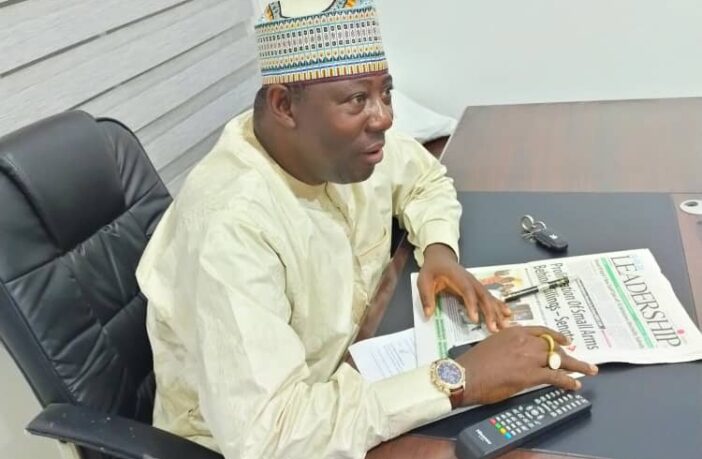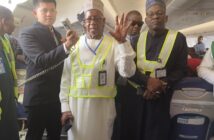Once again we are dealing with the Farouq Kperoqi, who I once described as Atlanta professor of ‘mischief’. Again, the Prof is spewing everwhere, with the aim of misleading the public about President Muhammadu Buhari and his party and we must quickly deflate the lies, deceit and outright mischief.
In one of his Facebook post on June, 21, 2022, Kperogi stood facts on its head like he usually does. He alleged that the All Progressives Congress (APC) appeared not to be ready to govern beyond 2023. He also claimed that the People’s Democratic Party (PDP) was better prepared for next year’s presidential election.
Nothing can be more mischevious. When has taking time to plan well become a headache? In any case, what’s Kperoqi’s qualms with how the APC organises its own affairs? It is obvious that the Prof lacks the dexteriy which the complex art of public commentary drmands. What’s wrong if a candidate present a placeholders? Politics is a game and what is required is minimal research to understand political interplays.
Needless to dissipate energy on Kperoqi’s Facebook rants. The facts speaks for itself. Well meaning Nigerians across all strata of our society can see, feel and even touch how President Buhari is building undeniable legacy of electoral credibility.
The revered American Author and motivational speaker, Mike Mudork, once said, “The greatest prove of success is in a successor.” And because of the sancrosanctity of preservation of legacies, leaders globally have had to do, sometimes, unthinkable things like pervert processes and procedures, and at other times bending rules or changing goal posts in the middle of the game, all in a bid to ensure their will prevail.
In the early years of the Fourth Republic, Nigeria had its fair share of leaders who tried hard to impose their will on the electorates by subverting the electoral process. But with President Buhari in the saddle, the tide is turning. We have watched the implementation of electoral reforms that is crystalizing in credible elections.
Buhari is setting a living example by the way he handles the APC presidential primary. Despite the involvement of his deputy, Vice Yemi Osinbajo, in the contest, he made it an open contest by creating a level playing field for all aspirants. He has been roundly commended for his statesmanship.
The just concluded Ekiti gubernatorial election climaxed Buhari’s narrative of change in the democratic process. For the benefit of hindsight, let me take an excerpt from the statement of European Union delegation to Nigeria and ECOWAS on the just concluded Ekiti election issued in Abuja on Tuesday, 21 June, 2022. “We congratulate all stakeholders and the people of Ekiti on a largely peaceful poll,” the international bodies stated.
The EU also commended the Independent National Electoral Commission (INEC), saying, “There was improved logistics, including early deployment of personnel and essential materials in the majority of the polling units, better functioning of the Bimodal Voter Accreditation System (BVAS) and efficient electronic transmission of polling unit results to INEC’s results viewing portal. This augurs well for the General Election in 2023.” This is a testament to what Buhari is doing to enthrone democracy in Nigeria, and he must be commended.
Through painstaking processes, sacrifices and efforts under Buhari, Nigeria is beginning to get it right by continuous improvement on laws governing electoral institutions. The recent passage and signing into law of the new Electoral Law climaxed the triumph of democracy in Nigeria. Nigerians from all walks of life, world leaders and multilateral institutions have continued to commend President Buhari for bracing the odds and despising enormous pressure against enacting the bill into law.
Suffice it to highlight some ups in the Buhari-inspired Electoral Act. Notably, the new law gives the Independent Electoral Commission (INEC) more decision-making powers and sets aside early funding for it to avoid embarrassing technical and logistic lags that saw the last elections in 2019 rescheduled and left some voters unable to exercise their rights in the end.
Perhaps, most importantly, the law also gives legal backing to the use of electronic card readers for voting and electronic methods for transferring results for collation, a sticking point for some politicians who had argued that the state of the country’s telecommunications system could hinder voting in some areas.
On the flip side, civil society members see the card readers, used for the first time in general elections in 2015, as aiding transparency and reducing incidences of rigging. But because the machines previously lacked legal backing, the admissibility of electronic data in courts has generated hot debates. That is why Buhari must be commended for his selfless leadership in the enactment of the Electoral Law.
With the new act going into effect immediately, INEC can test-run the rules as soon as July this year when neighbouring State of Osun will hold election for new governor.
Without a doubt, Buhari has gradually etched his name in gold of global democracy champions. The new law is a lifeline, as it holds the aceses to positively revolutionising elections in Nigeria. The technological innovations provision in the law would guarantee the constitutional rights of citizens to vote and to do so effectively.
Buhari has done his part by partnering effectively with the National Assembly and giving us good laws. Instead of casting aspersion on the system, what civil societies and other relevant stakeholders should concern themselves is trying to ensure that executors of the laws are held to account because Technology is a tool that is deployed by humans, and humans are imperfect. So there will be some issues but the goal is to keep them at the barest minimum.
In retrospect, Electoral participation concerns remain high in our country with turnout regularly hovering around 30 to 35 per cent – according to INEC, a low continental average. The new law would certainly boost the confidence of Nigerians in the electoral process, hence addressing the issue of voter apathy.
From the beginning, I had firm believe in him because Buhari himself came to power with a change agenda. What is clear by this is that he came to do things differently, run the country differently and impose a new culture of governance that will improve the living condition of the people and make the country a better, safer and united country.
Historically, President Buhari fought for the presidential diadem with the tenacity of a war horse. He went into the field three times, campaigning in various parts of the country to become the president of Nigeria. Three times he failed but didn’t stop there. He took his fate in his hands by approaching the courts as a true warrior. On all three occasions he had his grouses against the electoral system. Then the fourth time he got lucky. The APC was sewn together from three or four disparate groups to form a formidable platform on which Buhari ran and won.
Buhari would have found himself on the wrong side of history if he had failed to reform the electoral processes that robbed him of victory thrice. Thank God he did not disappoint Nigerians. Every time he travels to other country, he would always return with some take aways to be better the lot of Nigerians.
In Kigali where he is attending the ongoing CHOGM, Buhari posted a strong message. He said, “I visited the Kigali Genocide Memorial this afternoon. I took two lessons from this sobering tour: One, Nigerians must continue to be tolerant of one another, and two, we have a responsibility to preserve our own history from the Nigeria Civil War.
“As I wrote in the Visitors Book, ‘we pray that humanity will never experience this kind of hatred, wickedness and violence toward others because of their ethnic background, religion, and beliefs.”
“Nigeria is strongly committed to the prevention of mass atrocity anywhere in the world and believes that perpetrators of such crimes; and their enablers, anywhere in the world must be held accountable.”
Every country has their perculiar challenges. For us, Nigeria is the only country we have. Let’s join hands with the Buhari-led government to make it better for us, our children and unborn generation, instead of giving out precious time to arm-chair critics like the ‘naughty’ professor from Atlanta.
– Ibrahim is director, Communications and Strategic Planning, of the Presidential Support Committee (PSC)



